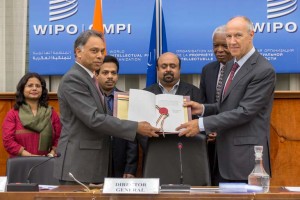[WIPO Press Release, Link] India has become the first nation to ratify the Marrakesh Treaty to Facilitate Access to Published Works for Persons Who Are Blind, Visually Impaired or Otherwise Print Disabled.
So far, more than 75 WIPO member states have signed the Treaty, which was adopted on June 27, 2013 at a diplomatic conference organized by WIPO and hosted by the Kingdom of Morocco in Marrakesh.
The Treaty will take effect after 20 ratifications or accessions are presented to WIPO. India was first after it officially notified WIPO of its ratification.
“We congratulate India on its ratification of the Marrakesh Treaty and hope this ratification will be the first of many,” said WIPO Director General Francis Gurry. “When the Marrakesh Treaty takes effect, the lives of people who are visually impaired around the world will be enriched.”
India’s Permanent Representative to the United Nations in Geneva Dilip Sinha said “India supports the Marrakesh Treaty for its human rights and social development dimension. The speedy ratification of the Treaty reflects India’s commitment to facilitating access to published works for the millions of blind, visually impaired and otherwise print disabled persons.” He added “We hope other countries will follow India’s lead quickly so the Treaty can enter into force and we begin to see real and tangible benefits for the world’s blind and visually impaired community.”
The Marrakesh Treaty to Facilitate Access to Published Works for Persons who are Blind, Visually Impaired, or otherwise Print Disabled addresses the “book famine” by requiring its contracting parties to adopt national law provisions that permit the reproduction, distribution and making available of published works in accessible formats – such as Braille — through limitations and exceptions to the rights of copyright rightholders.
It also provides for the exchange of these accessible format works across borders by organizations that serve the people who are blind, visually impaired, and print disabled. It will harmonize limitations and exceptions so that these organizations can operate across borders.
This sharing of works in accessible formats should increase the overall number of works available because it will eliminate duplication and increase efficiency. For example, instead of five countries producing accessible versions of the same work, the five countries will each be able to produce an accessible version of a different work, which can then be shared with each of the other countries.
The Treaty is also designed to provide assurances to authors and publishers that that system will not expose their published works to misuse or distribution to anyone other than the intended beneficiaries. The Treaty reiterates the requirement that the cross-border sharing of works created based on limitations and exceptions must be limited to certain special cases which do not conflict with the normal exploitation of the work and do not unreasonable prejudice the legitimate interests of the rightholder.
Background for Editors
According to the World Health Organization, there are some 285 million blind and visually impaired persons in the world, 90 per cent of whom live in developing countries. A WIPO survey in 2006 found that fewer than 60 countries have limitations and exceptions clauses in their copyright laws that make special provision for visually impaired persons, for example, for Braille, large print or digitized audio versions of copyrighted texts.
According to the World Blind Union, of the million or so books published each year in the world, less than 10 per cent are made available in formats accessible to visually impaired persons.
The World Intellectual Property Organization (WIPO) is the leading global forum for the promotion of intellectual property as a force for innovation and creativity to achieve positive change. A specialized agency of the United Nations, WIPO assists its 187 member states in developing a balanced international IP legal framework to meet society’s evolving needs. It provides business services for obtaining IP rights in multiple countries and resolving disputes. It delivers capacity-building programs to help developing countries benefit from using IP. And it provides free access to unique knowledge banks of IP information.
Related Links
For further information, please contact the Media Relations Section at WIPO:
- Tel: (+41 22) – 338 81 61 / 338 72 24
- Fax: (+41 22) – 338 81 40





